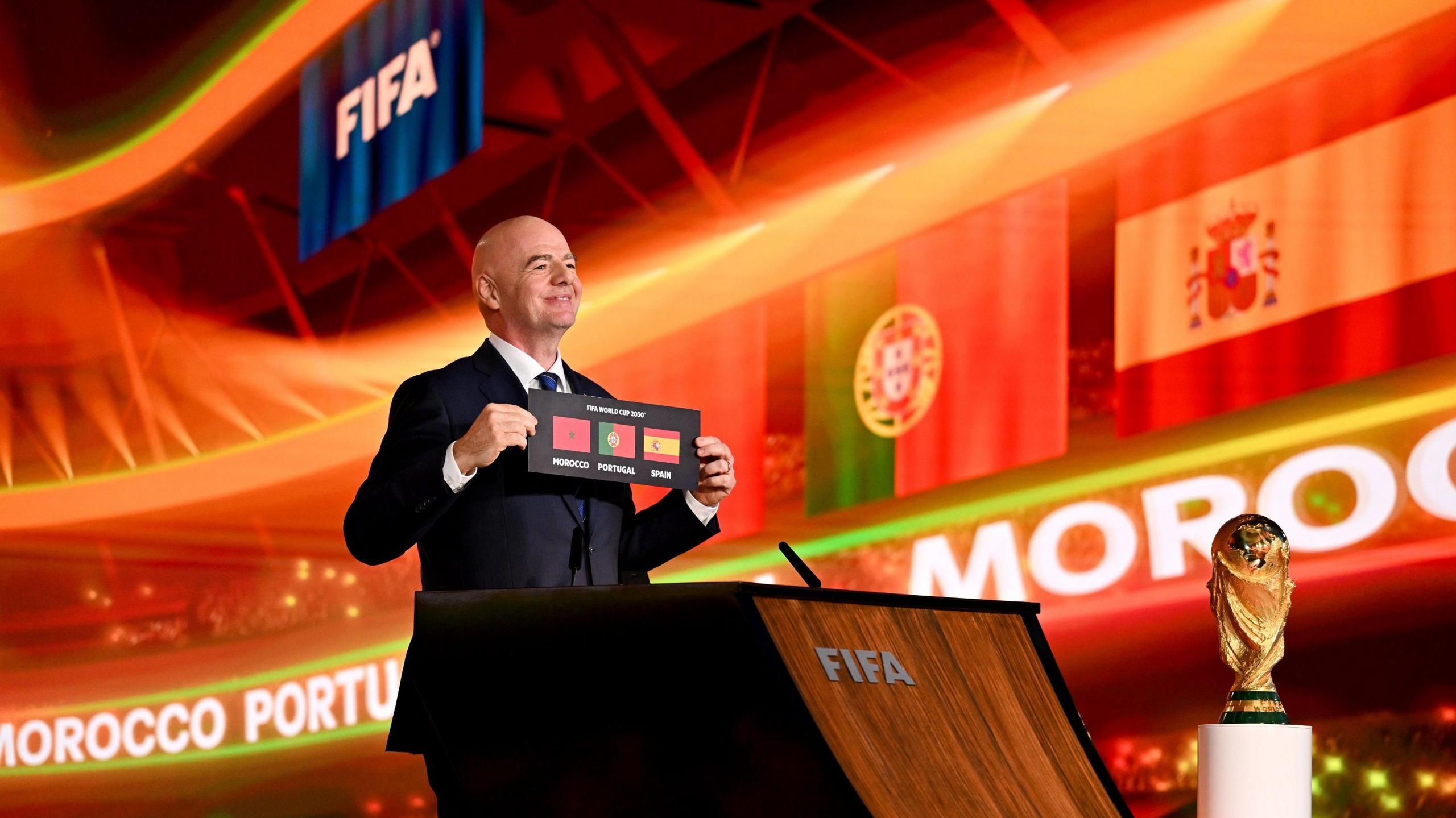'Every idea is a good idea' - how would 64-team World Cup look?

- Published
A 64-team World Cup?
The concept will sound like a step too far to some, but others believe it deserves real consideration.
In April, the South American governing body Conmebol raised an official proposal to expand the 2030 tournament to 64 teams, and Fifa will discuss it with leaders from the continent in New York this week.
The first 48-team World Cup will take place next summer across the United States, Canada and Mexico - expanded from the current 32-team format - but there are serious attempts from some to make it even bigger for 2030.
That tournament will be the first to be spread across three continents to mark its 100-year anniversary, with main hosts Spain, Morocco and Portugal being joined by Argentina, Paraguay and Uruguay in hosting opening-round matches.
But is the World Cup about to make more history? BBC Sport looks at whether a 64-team tournament could really happen and what it might look like.
What is being suggested?

The 2030 World Cup will be the competition's centenary edition
So, what is going on?
The idea was first "spontaneously raised" at a Fifa council meeting in March by Uruguayan Football Federation president Ignacio Alonso.
It was then presented at Fifa congress in April by Conmebol, which believes it would be a fitting way to mark the World Cup's centenary.
Fifa's official position has always been it will discuss expansion ideas with its stakeholders and it is duty bound to consider any proposals from its council members.
The Fifa council would make the ultimate decision, but there are no signs it is something expected to be made imminently.
How dramatic would this expansion actually be?
Fairly seismic is the obvious answer.
The pace of change has been remarkable, since the long-standing 16-team format increased to 24 teams in 1982.
It became a 32-team event in 1998 before being expanded to 48 teams for next summer's showpiece.
Adding another 16 teams for 2030 would mean the World Cup had doubled in size in eight years and would mean more than 30% of Fifa's current 211 members would participate.
Get in touch
Send us your questions
Who is in favour and who is against it?

Conmebol president Alejandro Dominguez (left) is in favour of a 64-team World Cup, while his Uefa counterpart Aleksander Ceferin (right) disagrees
Fifa president Gianni Infantino said "every idea is a good idea", but the proposal for a 64-team tournament has divided opinion among the six Fifa confederations and national associations.
Conmebol president Alejandro Dominguez said expanding the World Cup for its centenary would ensure "nobody on the planet is left out of the party".
Uefa president Aleksander Ceferin is among those to have dismissed the proposals, with the Slovenian saying it is a "bad idea" for both the tournament itself and the qualifying process.
Victor Montagliani, president of the governing body for football in North and Central America and the Caribbean (Concacaf), said the suggestion "doesn't feel right" and believes the expansion would damage "the broader football ecosystem".
Asian Football Confederation (AFC) president Sheikh Salman bin Ibrahim Al Khalifa agreed, saying further expansion would bring "chaos".
While there has been limited further public discussion, there are a few obvious reasons why people would be in favour and against the proposal.
Financially, more games would surely mean bigger TV deals and sponsorship possibilities.
The expanded 2026 format is already predicted to be generating more money than any previous World Cup through sponsorships, merchandising, ticket sales and broadcast revenues, with Fifa expecting to earn $11bn (£8.2bn) over the four-year cycle to December 2026.
By flinging its doors open wider than ever before, the tournament would be more inclusive and the change would probably result in a host of nations reaching the World Cup for the first time.
At the 2022 World Cup, hosts Qatar were the only team making their tournament debut.
Cape Verde are only one win away from joining already-qualified Jordan and Uzbekistan as debutants at the 2026 competition, while New Caledonia and Suriname could add to the growing number of debutants already in next summer's World Cup.
A 64-team tournament would also increase the likelihood of all the world's top players competing.
On the flip side, the competitive nature of the event would be brought into question. The potential for one-sided matches would increase, while qualifying would become even more a foregone conclusion for many nations than it is already.
Questions will be asked about the added amount of travel that players and fans will have to make, with sustainability likely to be an important issue with the increased number of flights needed to transport teams, fans and media.
Peter Crisp from fan climate campaign group Fossil Free Football said the move "would dilute the World Cup's prestige, kill off jeopardy in qualifying and worsen the extreme weather already harming football by producing more planet-warming pollution than ever".
What might it look like?

Spain, Portugal and Morocco will co-host the 2030 World Cup - but the opening matches will be held in South America
This is a difficult question to answer.
The notion of a 64-team tournament is almost unprecedented in top-level international sport, so it is difficult to cite any examples.
Next summer's expanded format is complicated enough, with the top two and best eight third-place finishers from 12 groups of four qualifying for the last 32.
The obvious structure for a 64-team World Cup in 2030 would be for the top two from 16 groups of four to qualify for the last 32. Perhaps a bit tidier than next years?
Should the proposal eventually be accepted, the 2030 edition would include 128 matches - up from the 64-game format played between 1998 and 2022.
Next year's World Cup will have 104 matches and will take 72 games – eight games more than an entire 32-team World Cup – just to get down to 32 teams.
From the start of the 2026 tournament until the end of the last 16 there will be 96 games across 27 days, with no rest day.
Just one of those days will feature a single match, and just two days will have only two matches. The remaining 24 days will feature three, four or even six matches.
Therefore, the impact of another 16 teams joining the fray is rather mind-boggling.
How would they fit in the extra matches?
Fifa has already stated the 2030 finals will run from 8 June, with the final on 21 July, and the possibility of making the tournament longer would seem unlikely with the footballing calendar already more tightly packed than many would like.
This would mean the need for more games per day in the group stages and thus extra stadiums would have to be considered.
There have been suggestions Argentina, Uruguay and Paraguay could host more games during these group stages.
And what would the impact be on qualifying?
For starters, it would be almost inconceivable that the world's top football nations would not qualify for the World Cup.
While Italy are currently preparing to sit out a third consecutive World Cup, such shock scenarios, which are all part of the drama, are hard to envisage should a 64-team tournament become a reality.
Conmebol could already see a maximum of seven teams qualify for next summer's event, and they would clearly want more members qualifying for an expanded tournament.
All other continents would also be expected to have more qualifying spots, but the logistics around this are purely guesswork for now.
The mere potential of a 64-team World Cup has raised plenty of questions - as well as eyebrows. Whether it gets off the ground or not remains to be seen, a matter for sporting and political power-brokers to figure out.
This article is the latest from BBC Sport's Ask Me Anything team.
What is Ask Me Anything?
Ask Me Anything is a service dedicated to answering your questions.
We want to reward your time by telling you things you do not know and reminding you of things you do.
The team will find out everything you need to know and be able to call upon a network of contacts including our experts and pundits.
We will be answering your questions from the heart of the BBC Sport newsroom, and going behind the scenes at some of the world's biggest sporting events.
Our coverage will span the BBC Sport website, app, social media and YouTube accounts, plus BBC TV and radio.
Related topics
- Published17 October

- Published16 August
